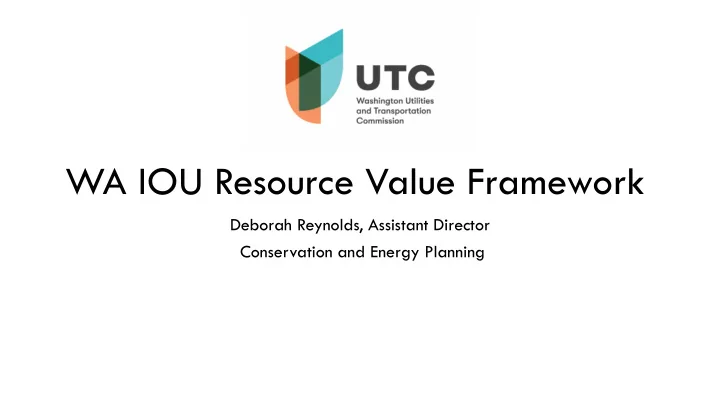

WA IOU Resource Value Framework Deborah Reynolds, Assistant Director Conservation and Energy Planning
Role of a state regulator – WA UTC Pursue all cost-effective conservation • Target setting • IRP process • Prudency review • Ongoing process 2
Why use the Resource Value Framework? • TRC provides a false impression of standardization across jurisdictions • National Standard Practice Manual by National Efficiency Screening Project, May 2017 • Regulatory perspective • Symmetry • Transparency 3
RVF Steps 1. Identify and articulate the jurisdiction’s applicable policy goals. 2. Include all utility system costs and benefits. 3. Decide which additional non-utility system costs and benefits to include in the test, based on applicable policy goals. 4. Ensure the test is symmetrical in considering both costs and benefits. 5. Ensure the analysis is forward-looking, incremental, and long-term. 6. Develop methodologies and inputs to account for all impacts, including hard-to-quantify impacts. 7. Ensure transparency in presenting the analysis and the results. 4
What to include in a WA IOU RVT? Cost and Benefit Inputs UTC Policy Goals • Public service laws • All utility system impacts • Safe and reliable • Other impacts based on • Lowest reasonable cost • Public interest objective applicable policy goals • Energy Independence Act • Economic benefits • Protect clean air and water • Energy independence • Stabilize electricity prices • High-quality jobs 5
Principles Policy Goals Reflected in Laws, Regulations, Orders, etc. Consistent with the Council method Environmental: Energy and Non- energy Impacts from Emissions, reduction of coal-fired electricity special consideration for senior special consideration for low- Hard-to-Quantify Impacts Forward-looking Analysis Efficiency as a Resource Lowest-Reasonable-Cost Economic Development Provide Safe Service Maintain Reliability Industry Neutrality income customers Resource diversity Used & Useful Transparency Public Health Manage Risk Symmetry citizens Water, Equity Public Service Laws and Policies: Subject Consider all costs and benefits, including PURPA environmental effects X X X X X X X X X X X Integrated Resource Planning statute requires utilities to consider public policies regarding resource preference adopted by Washington state or the federal RCW 19.280.010 government X X X X X X X X X X Utilities must consider the cost of risks associated with environmental effects including emissions of carbon dioxide, RCW 19.280.010 among other things X X X X X X X X X X RCW 19.285 Energy Efficiency Resource Standard X X X X X X X X X X RCW 19.285 Renewable Portfolio Standard X X X X X X X X 6
Statewide IOU Advisory Group (SWAG) • Began RVF with SWAG in June 2018 • Progress through Step 4 • Staff plans to present a proposal detailing costs and benefits to include in the test, based on applicable policy goals discussed with stakeholders • Possible outcomes - rulemaking, policy statement, or adoption through biennial plan order 7
Back to Step 1? W ASHINGTON C LEAN E NERGY T RANSFORMATION A CT , SB 5116, MAY CHANGE APPLICABLE POLICY GOALS • Sec 4(8) “…. equitable distribution of energy and nonenergy benefits and reduction of burdens to vulnerable populations and highly impacted communities; long-term and short-term public health and environmental benefits and reduction of costs and risks; and energy security and resiliency.” • SB 5116 and HB 1257 incorporate social cost of carbon into cost- effectiveness for electric and gas • Sec 24 Incorporate cumulative impact analysis developed by Department of Health 8
Thank You Deborah Reynolds Assistant Director, Conservation and Energy Planning Deborah.reynolds@utc.wa.gov, (360) 664-1255 9
Recommend
More recommend